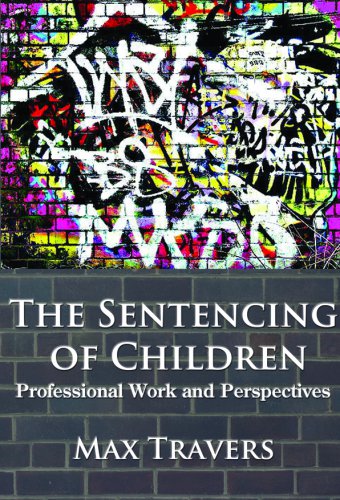
About the Author
After qualifying as a solicitor in the United Kingdom in 1988, Max Travers obtained a doctoral degree in sociology from the University of Manchester. He then moved to the University of Tasmania in Australia in 2003. His books include three monographs, The Reality of Law (1997), The British Immigration Courts (1999), The New Bureaucracy (2007); two textbooks, Qualitative Research Through Case Studies (2001) and Understanding Law and Society (2009); and two edited volumes, An Introduction to Law and Social Theory (2002) and Theory and Method in Socio-Legal Research (2005).
THE SENTENCING OF CHILDREN: Professional Work and Perspectives
Max TraversNew Academia Publishing, 2012
256 Pages
ISBN 978-0-9855698-7-7 Paperback
For BULK ORDERS, order directly from New Academia Publishing.
Queries: orders@newacademia.com
About the Author
After qualifying as a solicitor in the United Kingdom in 1988, Max Travers obtained a doctoral degree in sociology from the University of Manchester. He then moved to the University of Tasmania in Australia in 2003. His books include three monographs, The Reality of Law (1997), The British Immigration Courts (1999), The New Bureaucracy (2007); two textbooks, Qualitative Research Through Case Studies (2001) and Understanding Law and Society (2009); and two edited volumes, An Introduction to Law and Social Theory (2002) and Theory and Method in Socio-Legal Research (2005).
About the book
This book provides a detailed description of how professional groups collaborate in reaching sentencing decisions in children’s courts.
Even when it does not lead to riots or looting, the problem of youth crime continues to concern welfare and justice professionals across the developed world. Following in the tradition of ethnographers, such as Aaron Cicourel and Robert Emerson, this book provides a detailed description of how professional groups collaborate in reaching sentencing decisions in children’s courts. Based on observation of hearings in the three Australian states of Tasmania, Victoria and New South Wales, it describes the practical considerations in sentencing minor, and repeat offenders, and the mitigating factors that influence magistrates. These include economic circumstances, family problems and psychological difficulties, but also youthfulness itself. The study conveys the immense institutional effort spent in trying to reduce or contain the problem of youth offending in a developed, well-ordered society, which we largely take for granted. It supplies a well-documented insight into what actually happens inside children’s courts, and the challenges in addressing youth offending.
Praise
“This book has a discursive quality… It is a very user-friendly book and will be particularly accessible by students at all levels, both those with and without any socio-legal or criminology background.”
—Sharyn Roach Anleu, Professor of Social and Policy Studies, Flinders University, Australia.
“The book offers a well-researched and critiqued study of the sentencing of children… The discussion around theory is excellent. And the writing style is accessible and inviting.”
—Rosemary Sheehan, Associate Professor of Social Work, Monash University, Australia.





 Coming Soon
Coming Soon Awards
Awards